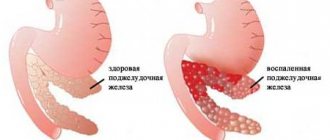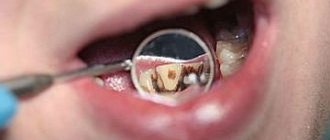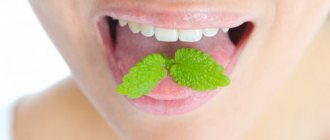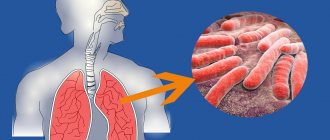Loss of taste in food (lack of taste for sweet, salty)
Loss of taste is a disease that is accompanied by disruption of the taste buds . It can be short-term - after eating too hot or cold food, or long-term, and this already signals problems with internal organs:
- ageusia is a pathological process accompanied by a complete loss of taste perception ;
- hypogeusia is a disease in which there is a partial loss of taste ;
- Dysgeusia is a pathology that is characterized by distortion of taste sensations and changes in perception.
Causes
One of the main causes of loss of taste is a cold or flu: a severe runny nose often dulls or even completely deprives the sense of taste. This happens because the viruses that cause a runny nose also infect the taste buds, causing them to lose the ability to perceive the necessary feeling.
Also, one of the reasons for changes in taste sensations is allergies, which stuff up the nose and interfere with the full perception of taste, depriving food of aroma.
Causes of complete loss of taste
The main factor in the complete loss of taste for sweetness or salt is long-term depressive and stressful conditions . Other ageusia factors include:
- infectious lesions of the nervous system pathways;
- inflammation of the lingual nerve or chorda tympani, accompanied by neuritis of the facial nerve;
- damage to the back of the tongue, which leads to neuritis of the glossopharyngeal nerve;
- pathologies of the medulla oblongata;
- inflammation of the vagus nerve.
This is interesting! In the human body there are significantly more bitter receptors than others. This is due to the fact that most toxic substances have a bitter and pungent taste.
Diseases in which there is a complete or partial loss of taste
- Neuritis of the facial nerve or inflammatory damage to the nerve that is responsible for facial muscles. In addition to loss of taste, the patient experiences weakening of the facial muscles and asymmetry . The patient cannot smile or frown, and the process of chewing food is difficult.
- Facial nerve paresis or paralysis is a pathology of the nervous system that occurs due to an infection of the upper respiratory tract. The pathology is accompanied by impaired taste perception and facial asymmetry .
- Acute viral hepatitis is an infectious lesion of the liver, as a result of which taste perception is impaired . The main symptoms of the disease are jaundice, diarrhea, vomiting and loss of appetite .
- Sjögren's syndrome is an autoimmune disorder that is accompanied by a decrease in secretion production from the salivary and lacrimal glands. Dryness in the nasopharynx, burning in the eyes and loss of taste are symptoms of this disease.
- ARVI - viral damage to the taste buds, damage to the nerve endings of the receptors responsible for taste, nasal congestion contribute to partial loss of taste . Normalization of taste perception is achieved after suppression of the virus in the body.
Taste buds
A violation of the sense of taste is a condition when it is difficult, and in some cases impossible, for a person to determine the taste of a substance using receptor cells. The disease can occur when taste buds or nerves that are responsible for transmitting impulses to the brain are damaged; if there are problems in the cerebral cortex, taste sensations often disappear due to the lack of smell.
Taste is the feeling that appears when exposed to the taste buds located in the oral cavity of various substances, which, with the help of the facial, glossopharyngeal or vagus nerves, transmit information to the cerebral cortex, where it, after analyzing the information and combining it with data received from the olfactory organ and with other sensations, produces the result.
Taste buds can distinguish only four (according to another classification - five) tastes: sour, salty, bitter, sweet, and umami. Taste acquires its hue when basic sensations are combined with the density, temperature, acidity, and spiciness of food, which are perceived by the oral cavity, primarily the tongue, and also the olfactory organ.
Of the twelve thousand taste buds that are in the oral cavity, ten thousand are located on the tongue, the rest are on the cheeks, palate, larynx, epiglottis, and pharynx.
They are neuroepithelial cells collected in papillae (from several pieces in small bulbs, to five hundred in large bulbs). Most of the bulbs are concentrated at the tip of the tongue; as they approach the root of the tongue, their number decreases.
A hole is formed in the center of the bulb, through which each receptor located in it brings out the finest villi, which, when in contact with a chemical substance, are responsible for identifying taste. A single receptor is capable of recognizing only one taste (sweet, salty, bitter, sour), so they are collected into one bulb only with those receptors that are capable of perceiving the same sensations as them.
The lifespan of the receptor is short: it lives no longer than fourteen days, and after it dies, it is replaced by another, which is the reason that with age a person’s taste preferences often change (in this case, the sense of smell also plays an important role).
Each taste bud is connected to the central nervous system by nerve fibers that send information about the identified taste. First, the impulses enter the brain stem, after which they go to the thalamus, the part of the brain where the final processing of information occurs and taste and its shade are determined.
Causes of partial loss of taste
Conventionally, the tongue can be divided into four parts, each of which is responsible for the perception of a certain taste.
Photo 1: The tip of the tongue is responsible for the sensation of sweet taste, the middle - for salty, the back of the tongue perceives bitter, and the edges of the tongue are responsible for sour sensations. Impaired perception is associated with various pathological processes in different parts of the tongue. Source: flickr (“R☼Wεnα”).
Sweet taste is lost
Loss of sweet taste can occur due to an inflammatory process at the tip of the tongue, a burn, or injury to this area. Disturbances in the papillae of the tongue, pathologies of nerve impulses to the brain are also factors in reducing the sensation of sweetness.
If you don't feel the salty taste
A weakening of the sensation of salty taste or its complete loss indicates injury to the middle part of the tongue. Bacterial and fungal infections (candidiasis) affect the tissues where taste buds are located .
Loss of salty taste perception is often caused by heavy smoking , which causes the taste buds to atrophy. Malignant neoplasms in the brain provoke ageusia or hypogeusia of salty taste, since the brain cannot recognize the incoming impulse.
Loss of sweet and salty taste
There are also several reasons that provoke the loss of sweet and salty taste at the same time:
- pathologies of the thyroid gland;
- long-term use of broad-spectrum antibiotics, antihistamines, anticonvulsants;
- hypovitaminosis (especially vitamin B12);
- lack of zinc in the body.
Demand for "smell"
Photo: depositphotos/Elnur_
Ovchinnikov cites data from the Yandex search engine, according to which in the week from October 5 to October 11, Russians sent 355 thousand requests with the word “smell.” This is 35% more than the week before, and 2.4 times higher than the May record, when the country experienced the first wave of coronavirus.
At the same time, the expert noted that the growth is not caused by media noise or seasonal colds, because queries with the words “runny nose” and “cold” are not growing. There is an increase in queries with the phrase “symptoms of coronavirus”, but these are also fewer than queries about the disappearance of smell and taste.
First of all, people are concerned about why this is happening and how to understand whether it is due to coronavirus or for some other reasons. Second question: how quickly will your sense of smell return? Boris Ovchinnikov
co-founder of the research agency Data Insight
Ovchinnikov added that the main increase in requests comes from the regions, and Moscow’s share does not exceed 17% of their total number. According to the expert, this may be due to differences in conditions for identifying infected people in the capital and regions. “Moscow has more opportunities in terms of infrastructure and budgetary support to more fully identify sick people,” the expert emphasized in a dialogue with Moscow 24.
Ovchinnikov also noted that among Russians there is an increase in queries not only about the sense of smell, but also in general about a wide range of questions about COVID-19. People are concerned about the symptoms of coronavirus, tracking the course of the disease, testing for covid and treatment with the assistance of a doctor.
How to treat loss of taste
To quickly restore your sense of taste, you should consult a specialist to diagnose the cause of the disease. Depending on the factor contributing to the loss of taste, appropriate treatment is prescribed:
- Dryness in the mouth, accompanied by insufficient secretion of saliva, will be eliminated by drugs that help moisturize the oral mucosa. For this purpose, artificial saliva preparations are prescribed - Salivart, Mouth Kote.
- In addition to medications, you can use mouth rinses . They not only moisturize the mucous membrane, but also have an antibacterial effect.
- If the loss of taste is associated with fungal infections of the mouth , drugs for candidiasis are prescribed - Clotrimazole solution, Decamine ointment.
- When diagnosing a lack of Zinc and vitamin B12 in the body, Zincteral, Berocca, and intramuscular injections of cyanocobalamin are prescribed. Additionally, multivitamin complexes may be prescribed.
- restore taste perception . The leaves of peppermint, lemon balm and motherwort have a sedative effect and eliminate the main cause of pathology - neurosis. When the oral cavity is infected with a bacterial or fungal nature, rinses made from chamomile flowers, calendula and oak bark are used.
- To increase the spiciness, you need to add spices to your food such as cloves, cinnamon, mustard and lemon.
Photo 2: Regular cleaning of the surface of the tongue reduces the risk of loss of taste. Source: flickr (Gabriella Yazickr).
Treatment
If you lose your sense of taste, you should take into account that this problem is not so much a dental problem as a general medical one, so if such a disease occurs, you should consult a therapist and it is advisable not to hesitate. Any taste disorder, especially one that occurs suddenly, without any apparent reason, is a reason to undergo a comprehensive examination, especially if after the first tests the doctor finds it difficult to make a diagnosis. The doctor will be able to prescribe treatment only after the cause of the loss of taste has been determined. When the underlying disease is cured, the sense of taste usually returns. To restore taste sensations, doctors often conduct a psychological assessment of the patient, while giving several important tips:
- First of all, the patient is explained how taste recognition occurs and how this is affected by temperature, density, and spiciness of food. This knowledge often contributes to improving the perception of taste.
- The patient is also advised to learn to enjoy the aroma of food: this affects the sense of smell, which has a direct interaction with the taste analyzer.
- The basic rule that must be followed is the need to eat only fresh, high-quality food and ensure that it does not spoil during storage in the refrigerator. Otherwise, if the taste is impaired, you can eat a spoiled product and become poisoned by it.
Throughout life, every person periodically faces such an unpleasant phenomenon as loss of taste. This condition can be temporary, after a person has damaged the mucous membrane of the tongue with hot or open food, or it can last for a long time. In the latter case, a full examination is necessary to exclude serious diseases .











